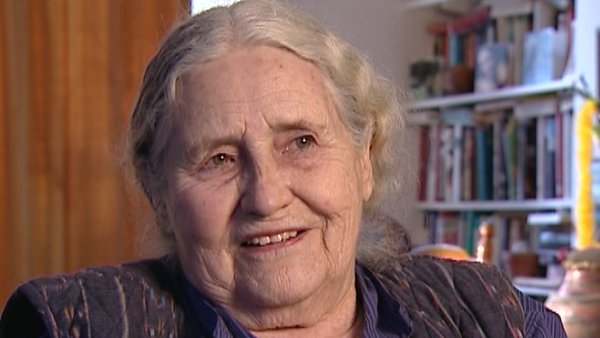NEXT STORY

The Golden Notebook
RELATED STORIES

NEXT STORY

The Golden Notebook
RELATED STORIES


|
Views | Duration | |
|---|---|---|---|
| 11. 'If Neanderthals, why not dwarfs and gnomes or whatever else?' | 506 | 03:32 | |
| 12. How to write non-realistic fiction | 532 | 02:34 | |
| 13. Feelings behind books | 444 | 03:31 | |
| 14. The Golden Notebook | 537 | 00:58 | |
| 15. Dealing with an alien child | 1 | 587 | 02:57 |
| 16. 'Ben is me!': why kids like Ben | 484 | 02:36 | |
| 17. The pleasure of finding things out | 365 | 01:51 | |
| 18. Solutions come in dreams | 450 | 04:38 | |
| 19. The sense of adventure is a gender thing | 1 | 389 | 02:10 |
| 20. Mara and Dann | 253 | 04:40 |


Where do I introduce the right voice in this story The Fifth Child? You have to at some point indicate – this is before this poor woman is having this difficult pregnancy – the two are in a house which they are thinking of buying, and it's a story which has... I mean, the house has a strong atmosphere, and they're in what will be the bedroom, and they have to make love. Behind them is a shadowy vista which... with something different about it, as if they were in a forest. So they give birth to a child which I suggest has a different beginning. So that is where the voice came in, when I said that the... the parents were making love with a feeling of strangeness.
And now I'm really going to go off at a tangent, and any writer will know what I am saying and understand. Just before I wrote The Fifth Child I was off with a group of people looking at the refugees from the Soviet invasion of Afghanistan, and it was an extremely frustrating experience because you couldn't get anyone to write about what the Russians were doing in Afghanistan. There was a kind of a... a ‘No' still hanging over from the communist era... when people, communists... you do not criticise the Soviet Union. So the people in Pakistan, they would say: you cannot get any story out of here, it's no good writing it, they won't print it. And I found when I came out... I mean, the most amazing newspapers wouldn't ... I'm terribly sorry, but they will never print this... like Newsweek, they will never print a story criticising the Soviet Union. I was so angry, I was so frustrated, I was... this is... these are our beautiful newspapers where I learnt just how venal they are. I was in a rage. That rage got into The Fifth Child.
Now, most writers will recognise that a very strong emotion that has nothing to do with a book, can be in that book and take it over, and it can be the charge, it can be the energy. My energy for writing The Fifth Child was fury, absolute rage and shame at what our newspapers are really like, because that's when I learnt...
So if I say to a writer, ‘That book that you wrote, there's a feeling about it – what was the impulse behind it?' And they'll say, ‘Oh, yes - of course it's got nothing to do with the actual book', they'll say, ‘I fell in love, and it's all in the book'. Or, ‘I was very sad because my best friend died', it's in the book. And this... this... no one will ever know this, but of course the writer; the readers will never know, the readers will not know...
British writer Doris Lessing (1919-2013) was awarded the 2007 Nobel Prize in Literature. Her novels include 'The Grass is Singing', 'The Golden Notebook', and five novels collectively known as 'Canopus in Argos'. She was described by the Swedish Academy as 'that epicist of the female experience, who with scepticism, fire and visionary power has subjected a divided civilisation to scrutiny'. Lessing was the 11th woman and the oldest ever person to receive the Nobel Prize in Literature.
Title: Feelings behind books
Listeners: Christopher Sykes
Christopher Sykes is an independent documentary producer who has made a number of films about science and scientists for BBC TV, Channel Four, and PBS.
Tags: The Fifth Child, Soviet Union, Pakistan, Newsweek
Duration: 3 minutes, 31 seconds
Date story recorded: June 2007
Date story went live: 21 October 2011